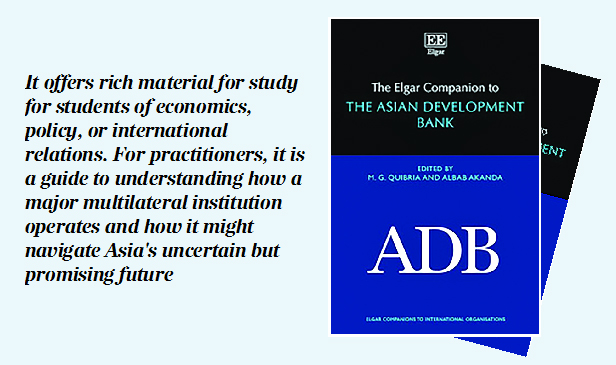
Published :
Updated :

In an era of shifting global power, climate urgency, and rapid technological disruption, the Asian Development Bank (ADB) remains a central force in shaping Asia’s development trajectory. A timely new book, The Elgar Companion to the Asian Development Bank (Edward Elgar Publishing, 2024), offers a panoramic view of how the Bank has evolved, where it has succeeded, and the challenges it now faces.
Spanning 330 pages, the volume brings together contributions from leading development scholars, former ADB officials, and practitioners. Edited by MG Quibria and Albab Akanda, it is intended both as a gateway for newcomers to the ADB and as a thought-provoking resource for policymakers, researchers, journalists, and development professionals.
Since its founding in 1966, the ADB has been instrumental in financing infrastructure, supporting reforms, and promoting regional cooperation. But today’s landscape is far more complex. The rise of new lenders such as the Asian Infrastructure Investment Bank (AIIB), the global reach of China’s Belt and Road Initiative (BRI), intensifying climate challenges, and the digital revolution are reshaping the very meaning of “development.” This Companion situates the ADB within this turbulent context and asks how it can adapt in a multipolar world.
The book’s nearly thirty chapters cover a wide spectrum—from agricultural transformation and urban governance to digital connectivity and post-pandemic recovery. Climate resilience looms large, with several essays examining whether the Bank’s financing tools and policy frameworks are appropriate for an age of extreme weather. Other chapters tackle gender equality, education, and social inclusion—areas now recognized as essential to sustainable growth.
The Companion features contributions from distinguished voices, including Stephen Groff (Governor, Saudi Arabia’s National Development Fund and former ADB Vice President), Prodipto Ghosh (former Permanent Secretary, Environment Ministry of India), Vinod Thomas (former Director General of ADB’s Independent Evaluation Department), Eugenia McGill (Columbia University), Clay Westcott (International Public Management Network), Xianbin Yao (former ADB Director General), and Ganeshan Wignaraja (former Sri Lanka Presidential Advisor). Their perspectives bring both insider knowledge and independent critique.
Importantly, the book looks inward, assessing the ADB’s governance, professional expertise, and comparative advantage. Issues of private sector engagement, accountability, and regional cooperation are examined through a critical yet constructive lens.
What sets this Companion apart is its forward-looking stance. It does not merely chronicle the ADB’s past; it asks how the Bank can reinvent itself to balance its infrastructure legacy with new demands for climate resilience, social equity, and technological readiness. The contributors stress that its continued relevance will depend on combining financial acumen with institutional innovation, local knowledge, and cross-border partnerships.
Accessible yet substantive, The Elgar Companion to the Asian Development Bank provides historical grounding alongside strategic insights. It offers rich material for study for students of economics, policy, or international relations. For practitioners, it is a guide to understanding how a major multilateral institution operates and how it might navigate Asia’s uncertain but promising future.
MG Quibria is a development economist who was a former Senior Advisor at the Asian Development Bank Institute, Tokyo. mgquibria.morgan@gmail.com
Albab Akanda is a former Principal Infrastructure Specialist at ADB. albabakanda@gmail.com


 For all latest news, follow The Financial Express Google News channel.
For all latest news, follow The Financial Express Google News channel.